|
|
|
Sort Order |
|
|
|
Items / Page
|
|
|
|
|
|
|
| Srl | Item |
| 1 |
ID:
137631
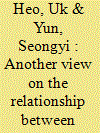

|
|
|
|
|
| Summary/Abstract |
Armed Forces and Society recently published an article, ‘‘Intra-Military Division and Democratization in South Korea’’ by Insoo Kim. In the article, Kim argues that economic development and civil society explanations for South Korea’s democratization are not sufficient because conflict in the military undermined the ability of Chun’s government to suppress the democracy movement, which made the transition possible. We refute Kim’s argument because economic development clearly made significant contribution to South Korea’s democratization by enhancing education attainment and facilitating industrialization and urbanization. Moreover, there is no clear evidence of schism in the military or among political elites, and the authoritarian leader Chun Doo-hwan agreed to change the presidential election system based on his political calculation.
|
|
|
|
|
|
|
|
|
|
|
|
|
|
|
|
| 2 |
ID:
172455
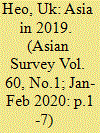

|
|
|
|
|
| Summary/Abstract |
Among the major events that occurred in Asia in 2019 were four that received global attention: the Regional Comprehensive Economic Partnership (RCEP), the US-China trade war, the North Korean nuclear issue, and protests in Hong Kong. These events have significant policy implications for the world as well as for Asia.
|
|
|
|
|
|
|
|
|
|
|
|
|
|
|
|
| 3 |
ID:
179226
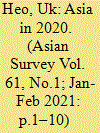

|
|
|
|
|
| Summary/Abstract |
The biggest stories of the year 2020 were the COVID-19 pandemic and a trade dispute between the United States and China. The pandemic significantly damaged the Asian economies. The US-China trade war halted after a phase one trade deal and the pandemic, but the future is unclear.
|
|
|
|
|
|
|
|
|
|
|
|
|
|
|
|
| 4 |
ID:
151724
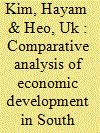

|
|
|
|
|
| Summary/Abstract |
Economic development in South Korea and Taiwan has received considerable scholarly attention, as they are two of the most successful cases since the 1960s. For all their similarities, differences also exist. Thus, we revisited economic development in South Korea and Taiwan to draw lessons for other developing countries. Our analysis indicates that no single development model will work in every country. Countries may learn from the successful cases but need to adjust the development model according to their political and economic conditions.
|
|
|
|
|
|
|
|
|
|
|
|
|
|
|
|
| 5 |
ID:
066413
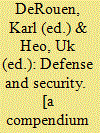

|
|
|
|
|
| Publication |
Santa Barbara, ABC-CLIO, Inc, 2005.
|
| Description |
2v.(lxi, 1013p.)
|
| Contents |
Vol.1: Angola-Mexico
Vol.2: New Zealand-Yugoslavia
|
| Standard Number |
1851097813
|
|
|
|
|
|
|
|
|
|
|
|
Copies: C:2/I:0,R:0,Q:0
Circulation
| Accession# | Call# | Current Location | Status | Policy | Location |
| 050276 | 355.0330003/DER 050276 | Main | On Shelf | General | |
| 050277 | 355.0330003/DER 050277 | Main | On Shelf | General | |
|
|
|
|
| 6 |
ID:
157770
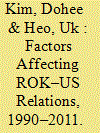

|
|
|
|
|
| Summary/Abstract |
This study investigates what factors affect Republic of Korea (South Korea)–United States (ROK–US) relations based on a theoretical framework, using event data created by content analysis from 1990 to 2011. South Korea’s economic development led to democratization, which resulted in elite changes. New progressive elites interpreted national interests differently and demanded changes in ROK–US relations. Accordingly, the ROK–US relationship was tense during the progressive administrations. ROK’s economic development attracted more trade with the US, which enhanced the bilateral relationship due to heightened interdependence. By contrast, the Democratic People’s Republic of Korea (North Korea)–US relationship and the trade between ROK and China did not significantly affect ROK– relations, meaning ROK’s relationship with other countries does not affect ROK–US relations.
|
|
|
|
|
|
|
|
|
|
|
|
|
|
|
|
| 7 |
ID:
134701
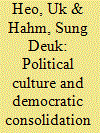

|
|
|
|
|
| Summary/Abstract |
South Korea experienced democratization in 1987, yet violations of the democratic rule of law are rather common; such actions are far from routine practices of democratic institutions. We argue that South Korea’s political culture is the reason for the tardy maturing of democratic institutions.
|
|
|
|
|
|
|
|
|
|
|
|
|
|
|
|
| 8 |
ID:
175112
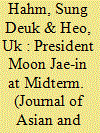

|
|
|
|
|
| Summary/Abstract |
Despite the unsuccessful outcomes of his policies on economic growth and North Korea, Moon Jae-in at midterm has received relatively high levels of job approval ratings compared to his immediate predecessors. What made it possible for him to maintain these ratings? To analyze this puzzle, we employed the three commonly noted leadership qualities—effective communication, political skill, and organizational capacity—suggested by presidential study scholars. We found that Moon Jae-in’s leadership qualities are not the compelling reason for his relatively high approval ratings. Instead, there are three alternative reasons for Moon Jae-in’s relatively high approval ratings: (a) better handling of the media; (b) collapse of the conservatives; and (c) multiple summit meetings with Donald Trump and Kim Jong-un. The latter two reasons are contextual factors, which are our theoretical contribution to the literature.
|
|
|
|
|
|
|
|
|
|
|
|
|
|
|
|
| 9 |
ID:
160388
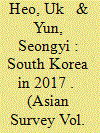

|
|
|
|
|
| Summary/Abstract |
The biggest story of 2017 in South Korea was the impeachment of President Park Geun-hye and the election of Moon Jae-in, shifting power from conservative to progressive. The economy showed signs of recovery despite multiple concerns. The North Korean nuclear crisis intensified tensions in the region.
|
|
|
|
|
|
|
|
|
|
|
|
|
|
|
|
| 10 |
ID:
164947
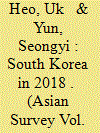

|
|
|
|
|
| Summary/Abstract |
The biggest story of 2018 was a series of summit meetings between US President Donald Trump, South Korean President Moon Jae-in, and North Korean leader Kim Jong-un to discuss the denuclearization of North Korea. The income-led growth policies of the Moon Jae-in administration have not stimulated the economy.
|
|
|
|
|
|
|
|
|
|
|
|
|
|
|
|
| 11 |
ID:
101544
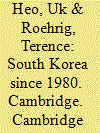

|
|
|
|
|
| Publication |
Cambridge, Cambridge University Press, 2010.
|
| Description |
vii, 216p.
|
| Standard Number |
9780521743532
|
|
|
|
|
|
|
|
|
|
|
|
Copies: C:1/I:0,R:0,Q:0
Circulation
| Accession# | Call# | Current Location | Status | Policy | Location |
| 055588 | 951.95044/HEO 055588 | Main | On Shelf | General | |
|
|
|
|
| 12 |
ID:
165023
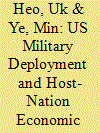

|
|
|
|
|
| Summary/Abstract |
Since the end of World War II, the U.S. military has deployed its troops all over the world for regional security and/or peace building. Despite the importance of its political, economic, and military impact on the region, few studies examined how U.S. military deployment overseas affects the host nation’s economy except Jones and Kane (2012) and Kane (2012). To help fill the gap in the literature, we tested how substantial U.S. troop deployment (more than 100 troops on average) affects the host state’s investment, trade, political development, and economic growth for the period from 1960 to 2014, using the seemingly unrelated regression (SUR) model. The results show that the presence of U.S. troops does promote investment, trade, and economic growth in the host state. The United States deploys troops for regional security purposes, but these deployments also help economic growth directly and indirectly.
|
|
|
|
|
|
|
|
|
|
|
|
|
|
|
|
| 13 |
ID:
178393
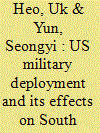

|
|
|
|
|
| Summary/Abstract |
Due to the lack of studies on the effects of US troops on an individual host state, we studied the effects of US troops on South Korea’s politics and economy. Based on security enhancement benefits, we hypothesized that USFK would have positive effects on South Korea’s investment, trade, economic growth, and political development. Employing Heo and Ye’s empirical models, we conducted statistical analyses and found that the effects of USFK on South Korea’s trade, democracy level, and economic growth are statistically insignificant and the effect of USFK on investment is negative and statistically significant. These findings need to be cross-validated with a different measure of estimating USFK’s effects because our measure, size of USFK, may not capture its effects completely although there is no other measure.
|
|
|
|
|
|
|
|
|
|
|
|
|
|
|
|
| 14 |
ID:
113753
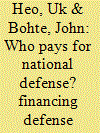

|
|
|
|
|
| Publication |
2012.
|
| Summary/Abstract |
Past studies on military expenditures in the United States have primarily focused on the extent to which guns versus butter trade-offs are prevalent without examining this relationship in the context of how other fiscal policy tools are used to pay for defense. Using annual data from 1947-2007, this study examines the relative importance of defense financing policy measures, such as guns versus butter trade-offs, tax increases, and deficit spending in paying for defense. The results show evidence of guns versus butter trade-off during the Reagan Era, but not during other periods. Both federal tax policy and deficit spending have played influential roles in funding defense spending during peacetime. This modeling strategy points to the importance of analyzing the effects of multiple fiscal policy tools when studying the forces that drive military spending in the United States since World War II.
|
|
|
|
|
|
|
|
|
|
|
|
|
|
|
|
|
|
|
|
|